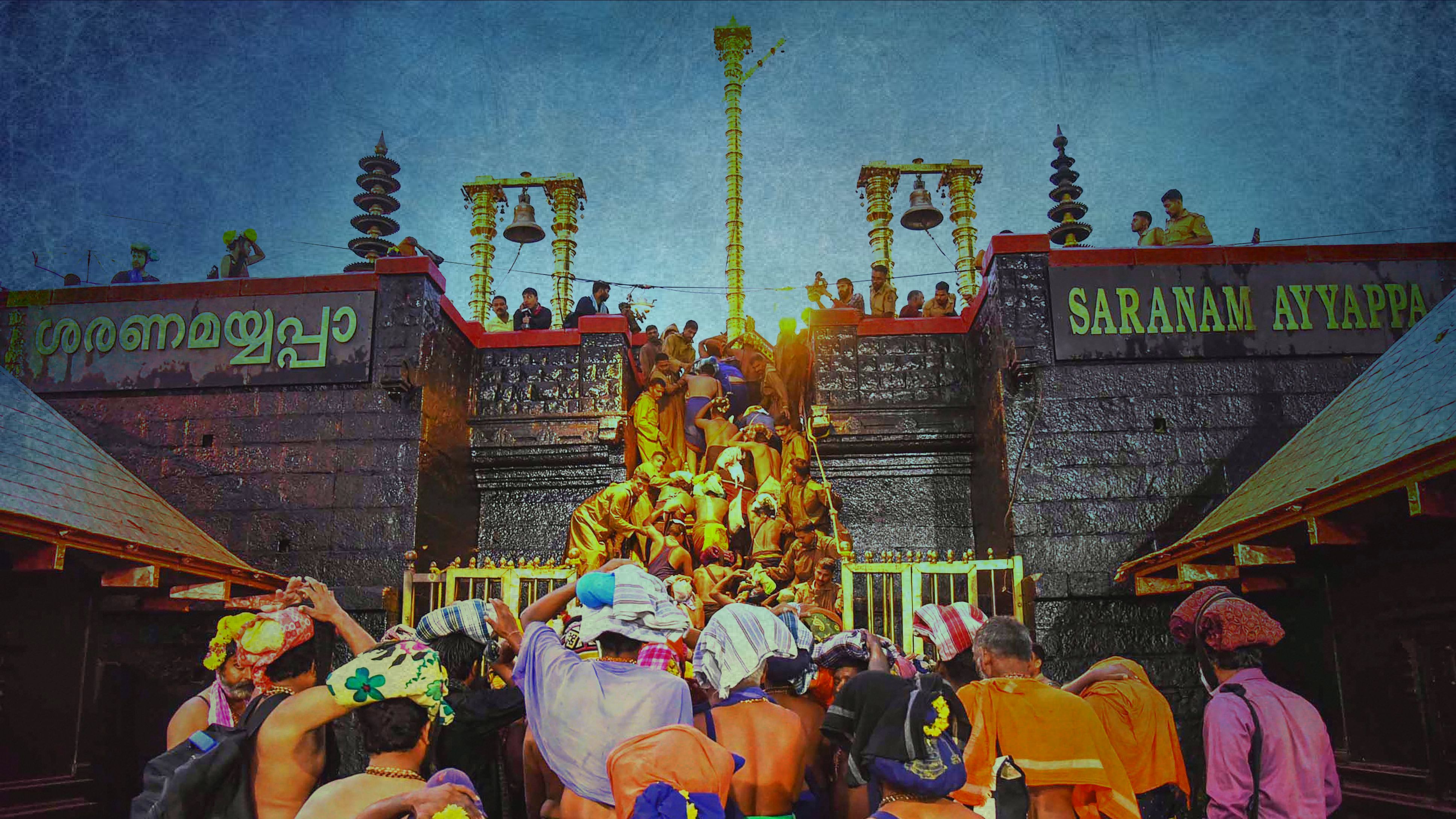Growing up around people who greatly believed in Lord Ayyappa's miraculous powers to grant wishes and ensure the prosperity of his devotees, it was always a matter of wonder that while women of a certain age could pray to him at home, they could never visit his temple in Sabarimala.
Men planning their annual pilgrimage in January to the hill top temple would fast for 40 days, grow beards, wear only unstitched garments and, yes, stay out of sight of women, particularly menstruating ones. Girls having their periods during the time had to spend those five days at their friends' or neighbours' homes. Apart from the embarrassment it caused to those little girls from homes where this rule was strictly enforced, it was also unfair and unjust to subject women to such public humiliation and isolation in the name of a bachelor god. Other bachelor gods like Lord Hanuman and Lord Ganesh did not demand such discrimination against one half of the human population.
Discrimination is a Travesty in Kerala
It seemed like a particular travesty that this should happen in a state – Kerala – where a largely matriarchal society placed a premium on the inheritance rights of women and to whom men played a secondary role even in matters of marriage and divorce. If the woman wanted a divorce, she simply rolled up her husband's mattress and placed it outside their bedroom door. The man had to return to his parental home without protest and find some one else to marry.
That system was outlawed soon after Independence and many non-discriminatory Keralites believed the government even then, while equalising the men, should have passed a law giving women similarly equal rights to pray at the temple in Sabarimala as the Maharaja of Travancore, in one fell swoop, had done with regard to Dalits in 1936.
Prior to that decree, the temple entry committee at Sabarimala banned even Dalits on the same grounds – that they would defile the good Lord with their worship.
But more than 80 years later no one questions their right to pray at Sabarimala while even these Dalit men discriminate against their women in this regard.
Resistance to Change: Then and Now
When the then Travancore royal had taken the decision to equalise Dalits in terms of temple worship there was similar furious Brahminical opposition to the move. But they could do little in the face of his intransigence and determination to equalise Hindu society. How discriminatory the Brahminical men on the temple committee were can be gauged by the fact that they equated vultures, dogs, donkeys and other animals with “ certain classes of people" who could not be allowed to defile the sanctum sanctorum.
Nearly a century later it was left to the Supreme Court of independent India to remove women from that category of defilers and grant them equal right to pray at the Sabarimala temple.
The November 14 decision to refer their earlier 2018 judgment to a seven-judge bench without staying that order is clearly an attempt to diffuse tensions and yet at the same time safeguard the constitutional rights of women.
How Other Judgments on Shrines Could Affect Sabarimala Verdict
In view of last week's verdict on the Ayodhya dispute, the petitioners in the Sabarimala case were hoping that the Supreme Court would similarly uphold faith over the law but it might have been not a very easy task for the honourable judges to do so. For they are squashed between a judgment (Ayodhya) that might not be very good in law and their own progressive rulings in not just Sabarimala but also the Shani Shingnapur temple and the Haji Ali mosque cases.
In a landmark judgment in March 2016, the Bombay High Court allowed women entry into the sanctum sanctorum of the Shani Shingnapur temple in the Ahmednagar district of Maharashtra and in a later judgment, endorsed by the Supreme Court, also ordered the Haji Ali Dargah Trust to similarly allow Muslim women inside their sanctum sanctorum.
Both the Maharashtra government in the case of the Shani temple and the Dargah trust in the case of the mosque complied without protest.
So how could this Bench of the Supreme Court have regressed to orthodox tradition and discrimination and overturned its own judgment of a couple of years ago without any other factors – like the Constitutional rights of women – having undergone any change by law or societal perceptions?
Gender Justice Needs to Become the New Mantra
Many are confused by the clubbing of cases relating to mosque entry for Muslim women and the rights of Parsi women married outside their community to perform the last rites of their parents as well as that of Bohra women not to be subjected to genital mutilation. However, its is not religion or rituals and personal laws but gender justice that is the common thread running through the minds of the justices wishing for larger wisdom to prevail even if some women, including one of the judges on this Bench, think in more orthodox fashion.
With women of all religions being discriminated against by the orthodoxy of their respective faiths, gender justice needs to become the new mantra of the executive and judiciary for an equitable society in real terms.
(Sujata Anandan is a journalist, and author of `Hindu Hriday Samrat: How the Shiv Sena changed Mumbai forever', 'Maharashtra Maximus: The state, its people & politics' and tweets @sujataanandan. This is a an opinion piece, and the views expressed above are the author’s own. The Quint neither endorses nor is responsible for the same.)
